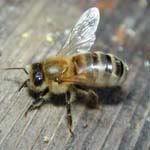
A virus has emerged as a strong suspect in the hunt for the mystery disease killing off North American honeybees.
Genetic research showed that Israeli Acute Paralysis Virus (IAPV) turned up regularly in hives affected by Colony Collapse Disorder (CCD).
Over the last three years, between 50% and 90% of commercial bee colonies in the US have been affected by CCD.
[snip]
Theories on what is causing it have ranged from mobile phone radiation to pesticides, from genetically-modified crops to climate change.
Disease remained a strong contender though, particularly in the light of the known impact of mites such as the varroa. And genetics offered the opportunity to analyse what organisms were living with and on the bees.
"The genome of the honeybee had just been completed," noted Diana Cox-Foster, an entomologist from Penn State Universiity. "So it was possible to do the (genetic) sequencing and then eliminate the genetic material of the bees."
The scientists' trawl revealed a diverse cargo even in healthy colonies. Eight types of bacteria appeared to be present in all bees, suggesting they perform some function useful to their hosts.
The researchers also found genes from parasites, fungi, and viruses, in both healthy hives and in those which had undergone collapse. But IAPV only appeared in samples from CCD populations.
Prime suspect
"This virus appears to be strongly associated with CCD," commented Dr Cox-Foster, "but whether it's the causative agent or just a very good marker (of the syndrome) is the next question we need to address."
And if it is a cause, it might not be the only one.
"I still believe that multiple factors are involved in CCD," said Jeff Pettis, "and what we need to do is look at combinations such as parasites, stress and nutrition (together with the virus)."
4 comments:
I was just about to send you the link to that. I'm glad I checked first.
Appreciate that, Morse!
Obviously the scientists are getting close, but bees aren't safe yet (was going to put 'out of the woods'...).
It will time to celebrate when they've returned the hives to full strength. We all like to eat...
How fragile the thread...
And how we blissfully ignore it..
Post a Comment